
Background information
Why the 10-per-cent rule in jogging is actually wrong
by Siri Schubert

To run a half marathon. In our early 40s, for the first time in our lives and with practically no running experience - that was our goal six months ago. We started training for it. Now the goal has been reached and we are at the end? Or are we back to square one?
Mission accomplished! That's the shortest possible conclusion for Claudio's and my challenge, which we voluntarily set ourselves just over six months ago: To complete the half marathon at the Greifenseelauf. On Saturday, 21 September, at around 13:30, we were able to embrace each other in the finish area, exhausted, exhausted, but damn successful and happy.
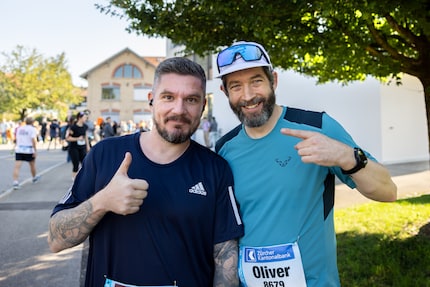
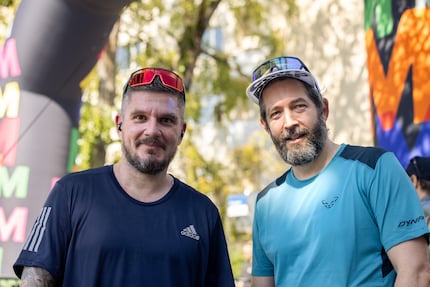
If you remember the beginning of our project, we have to say: mission accomplished. After all, the half marathon was only supposed to be part of the bigger mission, the first milestone, so to speak. Namely, to change our lifestyle for the long term. From couch potatoes to - not exactly sports fans, but still - part-time exercise enthusiasts (or something like that). And from "too-much-often-too-much-and-the-wrong-things" overeaters to "enough-at-the-right-time-and-the-right-things" eaters.
The new me:
The test results provided by the performance and metabolic analysis of the professionals from Medathletik at the end of March were sobering to say the least: my body was getting 66 per cent of its energy, of which it didn't even need that much, from carbohydrates and just 19 per cent from fats and 15 per cent from protein. It would have been healthy if the values for carbohydrates and fats had been swapped. My basal metabolic rate was 1722 kilocalories per day and my metabolic flexibility (the responsiveness of my metabolism to external influences such as exercise and diet) was low, I was a so-called "slow burner". Lousy conditions for a long, healthy life.
Six months later, with three to four running workouts a week and a thorough analysis and targeted change to my diet, my body seems to have made the turnaround. The comparative analysis a few days before the Greifensee run reads much more positively: 60 per cent of the energy requirement is covered by burning fat, only 25 per cent by carbohydrates, the basic energy turnover has increased to 1817 kilocalories per day. The "slow burner" has become a "high voltage performer" with optimum metabolic flexibility.
Half a year ago, I had set myself an average kilometre time of seven minutes and a running time of 2:27 hours for the half marathon. When I was waiting for the starting signal on 21 September, I had already defined this goal much more ambitiously based on my training successes up to that point. About a six-minute kilometre and a finishing time of 2:06 to 2:10 hours. In the end, the effective running time was 2:00 hours (and 10 seconds ...). So the goal was more than achieved - but you know what? The ten seconds are still annoying as hell.
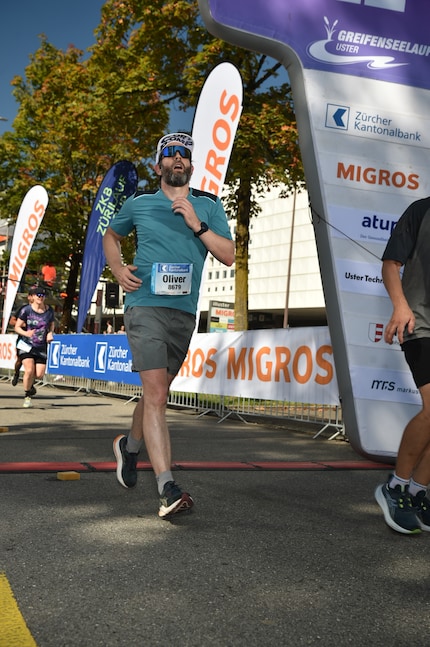
The new me:
.. is unfortunately not much further along physically than the old me. The test results at Medathletik a few days before the Greifenseelauf were sobering. Even six months ago, the main source of energy for my body was 47 per cent fat, followed by 38 per cent carbohydrates and 15 per cent protein. After all, my metabolic flexibility was rated as high, which in itself is a very good prerequisite for both dietary changes and training. But ...
.. six months and many training sessions (on foot, on the bike and on the fitness machine) later, I was frustrated when my performance and metabolism were analysed again. I am currently getting more energy from carbohydrates (+6%) and less from fats (-6%). In other words, I could only dream of fat loss and weight loss in the last six months. I regularly had to/was able to see for myself that not much had changed on the scales. But when I saw the test results in black and white, it was really quite a downer for me. When I spoke to Dimitri from Medathletik, it quickly became clear that all the training and changes to my diet (which, as you know, I only started doing late in life) wouldn't help if I didn't plan enough time for recovery. In other words, I need to allow myself more sleep. And unfortunately that wasn't quite so easy (not only) in the last six months. I've had to go out at night too often because of the children and I've also found it difficult to switch off at the weekends. But I'm the only one to blame, I don't hold my family or my environment responsible for this. I am an adult who is responsible for myself and my own well-being. And I haven't done that enough recently. I've now learnt the hard way via performance and nutritional diagnostics.
However, the sad news had no influence on my participation in the Greifensee Run. I wanted to prove to myself that I could complete the run, even if the test results predicted anything but the best times. Of course, I quickly asked Dimitri whether he would advise me not to run due to the poorer results. Absolutely not, he said, and motivated me to take part in the event and enjoy it. And that's exactly what I did. Of course, a time of over 2 hours and 40 minutes for 21 kilometres is no great feat. But I completed the run and was able to prove to myself that I could do it physically if I just respected my own limits and tried not to overdo the pace. Of course, I didn't succeed at the beginning because I let myself be pulled along too much by the crowd. That paid off after the halfway point at the latest. But I made it to the finish - and nobody can take that away from me.
Now I have to concentrate on my rest periods, thin out the agenda a little and be my own best self. I've already registered for the next Greifenseelauf and would like to take part in one or two smaller events along the way. I can only do this by continuing to train and paying attention to my diet - and by getting enough sleep and rest so that my body can regenerate and put all the input into practice. I'm definitely looking forward to it.
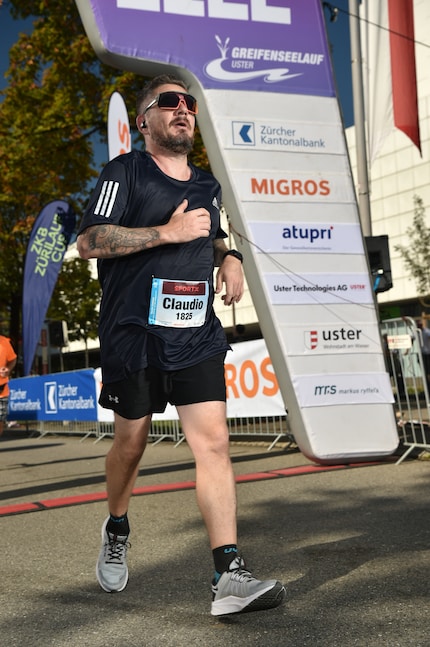
Of course, Claudio and I have seen each other regularly over the last six months and exchanged information about the progress and difficulties we have encountered with our project. We also completed the odd training run together and did the performance tests together. At the end, however, we took some time to look back, take stock and discuss our plans for the future:
Oliver: When you think back to the start of our challenge six months ago, what did you personally see as the biggest hurdles?
Claudio: My first thought was: "Will I have enough time for everything that's coming up?" But I quickly realised that it was my inner, huge, bastard who was speaking up. I would be lying to myself if I put it down to time, because I can make it. The fear that I wouldn't be able to bring myself to go out and run, that I would always be looking for - and finding - excuses for not being able to train right now was definitely there.
How was that for you?
Oliver: To be honest, I had the most respect when it came to nutrition. And the fear that I wouldn't be able to seriously tackle it and change my eating behaviour. Because I realised that I couldn't do it on my own. Food affects my family too. I couldn't have suddenly made a lot of radical changes for myself without also changing something for them. That's why I kept putting off tackling the topic seriously. I was lucky that my wife got on board straight away and even explicitly asked me to take her with me from the start and tackle the topic of healthier eating together. And I didn't want to go on a diet or jump on some trend like low carb, low fat or paleo anyway, but rather change things that make sense in the long term.
The second topic I was concerned about was how my damaged and operated knee (torn cruciate and collateral ligaments) would cope with the increased strain.
Claudio: I'm totally surprised that the change in diet was such a big uncertainty factor for you. For me, having small children was actually an advantage. You can put whatever you want on the table, they either want to eat or they don't, no matter what's on the plate. I didn't have to be considerate at all.
Oliver: I never had to worry about not having enough time for training because of my daughter. At nine and a half, she's old enough for me to leave her at home alone after school and go for a run. She's also often at friends' houses, so I've always been able to take my slots.
Claudio: You were still able to tackle the nutrition issue well. Just relatively late in the six months, right?
Oliver: Yes, exactly. At some point, we started to familiarise ourselves together and made small adjustments step by step. We're now on the right track without suddenly having to give up a lot of things. We've always cooked a lot ourselves anyway and consumed very little convenience food. Now we pay more attention to the what, but above all to the when, how and how much. From today's perspective, I had too much respect for the topic, but we certainly didn't rush into anything.
Claudio: Hey, it's similar for us. We always make sure we buy lots of fresh produce, partly because of the children. Especially because of the sugar in processed foods.
Oliver: Were there things you didn't expect at all at the beginning? Difficulties or motivating things?
Claudio: The feeling straight after running. I was a bit afraid of the physical exhaustion and how it would affect my everyday life if I didn't get enough sleep. But this physical feeling and the happiness hormones that are released are really cool. The more negative aspect was the recovery time, which was longer and more unpredictable than I had expected. That made planning difficult. Over time, however, I noticed big, positive changes. After the Greifensee race in particular, I initially had very sore muscles, but by Monday evening they were gone again. How did you feel in that respect?
Oliver: We measured our heart rate zones before the start of the project. I had to be sooooooooooooo slow for the basic endurance and optimum fat burning, it was really difficult. I did this for just under a month and then increased the pace. I had the feeling and the need for it and my body coped really well.
Because of this good feeling, however, I then went to the other extreme and tended to overdo it with the amount and respective exertion. In my half marathon preparation training at Garmin, I always did the maximum duration and intensity that was suggested. Over time, that became too many sessions for me. At some point, I started to skip one or two training sessions without a replacement. Otherwise I would have missed out on my family in the long run.
But hey, the big story is behind us: goal achieved. Have you stopped everything again and thrown all good intentions overboard?
Claudio: Haha, on the contrary! I've already signed up for next year's run. I'll probably start in the elite category then. My goal this time was just to get through and I'm really happy with that. But now I want to take my time and prepare longer and better, and also do the odd run in between, or even a shorter one. I've already set my sights on the Greifensee run.
Of course, I want to beat my time significantly. Even now, I'm running against myself and against the question of whether I can even manage a half marathon. Apart from the fact that I really enjoyed it, I also think the event itself is very cool. And you? Have you signed up anywhere yet?
Oliver: No, I haven't registered anywhere yet. But of course I've already researched what running events there are throughout the year. And since you've already registered for the Greifenseelauf, I'll probably do it too. Even though I didn't really like the crowds on the course. That's why I've already been looking for smaller regional runs where - hopefully - there will be slightly fewer participants. My idea at the moment is to organise two half marathons and three or four smaller, shorter runs per year. I would like to emphasise the where. How beautiful the route is, the landscape; I also want to enjoy the surroundings during the runs.
The most important realisation for me from this six-month period is this: I have a lot more fun and get a lot more satisfaction out of my Sunday morning run in the drizzle, all alone on some forest path, with a podcast in my ears, than I do when I cross the finish line after the official half marathon in my target time. That's nice too, sure; but I'd rather go out and run to be outside and run.
Claudio: I'm with you one hundred per cent on that! The best thing about this six months was my own training sessions, the feeling of being able to control the load, sometimes a little more, sometimes a little less, but just being outside and on the move.
Globetrotter, hiker, wok world champion (not in the ice channel), word acrobat and photo enthusiast.
Interesting facts about products, behind-the-scenes looks at manufacturers and deep-dives on interesting people.
Show all
Background information
by Siri Schubert
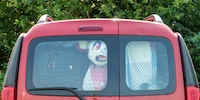
Background information
by Michael Restin

Background information
by Anna Sandner